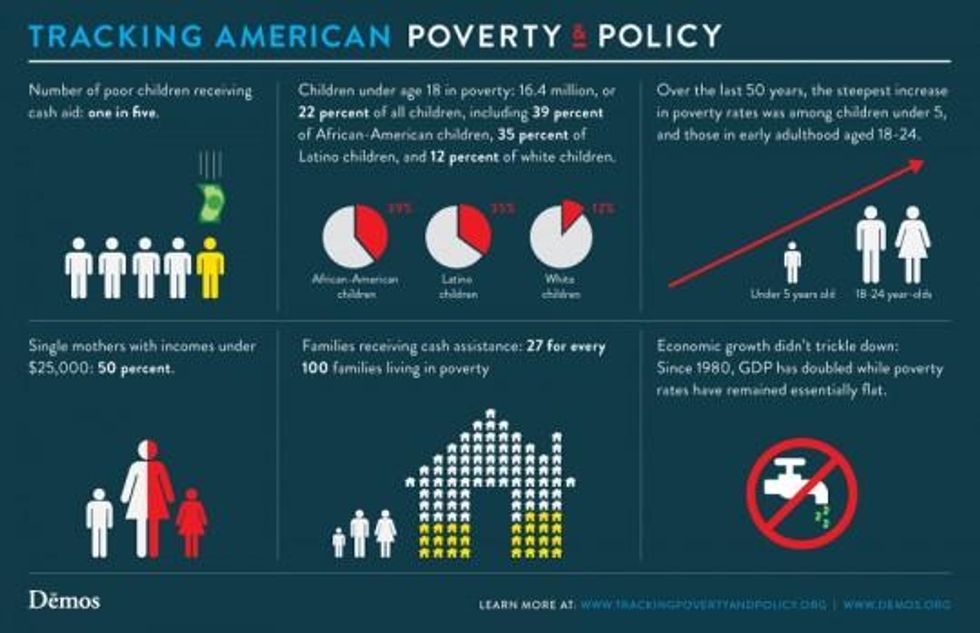US Poverty Rate Reaching 50-Year High
Economist Dean Baker: "The real tragedy is that this economic collapse was totally preventable before the fact and it could be quickly overcome even now with the right policies."
Poverty in the U.S. is on track to be at its highest level in 50 years, according to analysis collected by the Associated Press. Meanwhile, social safety nets are being pulled out from under those in need, leaving them in a spiral downward with little hope of escape.
The consensus of the more than dozen economists and think tanks the AP surveyed, both left- and right-leaning, was that the poverty level -- 15.1 percent in 2010 -- would reach as high as 15.7 percent for 2011. Even the 2010 figures represent a record breaking number. The Census Bureau states that "the number of people in poverty in 2010 (46.2 million) is the largest number in the 52 years for which poverty estimates have been published."
A mere tenth of a percent increase to 15.2 percent would make the poverty level match 1983's rate, which was the highest since1965, AP reports.
Economist Dean Baker of the Center for Economic and Policy Research says that "a rise in the poverty rate is the entirely predictable result of a high unemployment rate and cutbacks in various forms of government support" and sees little chance of a change in course.
"The real tragedy is that this economic collapse was totally preventable before the fact and it could be quickly overcome even now with the right policies. However, in both cases there is not the political will. The interest groups that dominate U.S. politics are just fine with the current situation," Baker stated.
The safety net allowing some to scrape by are at risk, with unemployment insurance, food stamps and welfare getting cut. But Peter Edelman, director of the Georgetown Center on Poverty, Inequality and Public Policy, tells the AP, "The issues aren't just with public benefits. We have some deep problems in the economy."
Edelman, author of So Rich, So Poor: Why It's So Hard to End Poverty in America, also highlighted the problem of low-wage jobs affecting poverty when he spoke to Bill Moyers in June. "[W]hat I'm worried about is the longer term continuance of this plethora of low-wage jobs. "Of the inability of people at the bottom, and not just the poor, I'm talking about the whole lower half. The way the median wage absolutely stagnated beginning 1973. The economy grew over the last 40 years basically doubled in size. And the entire lower half got none of that. The median wage went up 7 percent in 40 years. A fifth of a percent a year," Edelman said during his interview with Moyers.
* * *
Graphic from Demos on poverty in the U.S.:

An Urgent Message From Our Co-Founder
Dear Common Dreams reader, The U.S. is on a fast track to authoritarianism like nothing I've ever seen. Meanwhile, corporate news outlets are utterly capitulating to Trump, twisting their coverage to avoid drawing his ire while lining up to stuff cash in his pockets. That's why I believe that Common Dreams is doing the best and most consequential reporting that we've ever done. Our small but mighty team is a progressive reporting powerhouse, covering the news every day that the corporate media never will. Our mission has always been simple: To inform. To inspire. And to ignite change for the common good. Now here's the key piece that I want all our readers to understand: None of this would be possible without your financial support. That's not just some fundraising cliche. It's the absolute and literal truth. We don't accept corporate advertising and never will. We don't have a paywall because we don't think people should be blocked from critical news based on their ability to pay. Everything we do is funded by the donations of readers like you. Will you donate now to help power the nonprofit, independent reporting of Common Dreams? Thank you for being a vital member of our community. Together, we can keep independent journalism alive when it’s needed most. - Craig Brown, Co-founder |
Poverty in the U.S. is on track to be at its highest level in 50 years, according to analysis collected by the Associated Press. Meanwhile, social safety nets are being pulled out from under those in need, leaving them in a spiral downward with little hope of escape.
The consensus of the more than dozen economists and think tanks the AP surveyed, both left- and right-leaning, was that the poverty level -- 15.1 percent in 2010 -- would reach as high as 15.7 percent for 2011. Even the 2010 figures represent a record breaking number. The Census Bureau states that "the number of people in poverty in 2010 (46.2 million) is the largest number in the 52 years for which poverty estimates have been published."
A mere tenth of a percent increase to 15.2 percent would make the poverty level match 1983's rate, which was the highest since1965, AP reports.
Economist Dean Baker of the Center for Economic and Policy Research says that "a rise in the poverty rate is the entirely predictable result of a high unemployment rate and cutbacks in various forms of government support" and sees little chance of a change in course.
"The real tragedy is that this economic collapse was totally preventable before the fact and it could be quickly overcome even now with the right policies. However, in both cases there is not the political will. The interest groups that dominate U.S. politics are just fine with the current situation," Baker stated.
The safety net allowing some to scrape by are at risk, with unemployment insurance, food stamps and welfare getting cut. But Peter Edelman, director of the Georgetown Center on Poverty, Inequality and Public Policy, tells the AP, "The issues aren't just with public benefits. We have some deep problems in the economy."
Edelman, author of So Rich, So Poor: Why It's So Hard to End Poverty in America, also highlighted the problem of low-wage jobs affecting poverty when he spoke to Bill Moyers in June. "[W]hat I'm worried about is the longer term continuance of this plethora of low-wage jobs. "Of the inability of people at the bottom, and not just the poor, I'm talking about the whole lower half. The way the median wage absolutely stagnated beginning 1973. The economy grew over the last 40 years basically doubled in size. And the entire lower half got none of that. The median wage went up 7 percent in 40 years. A fifth of a percent a year," Edelman said during his interview with Moyers.
* * *
Graphic from Demos on poverty in the U.S.:

Poverty in the U.S. is on track to be at its highest level in 50 years, according to analysis collected by the Associated Press. Meanwhile, social safety nets are being pulled out from under those in need, leaving them in a spiral downward with little hope of escape.
The consensus of the more than dozen economists and think tanks the AP surveyed, both left- and right-leaning, was that the poverty level -- 15.1 percent in 2010 -- would reach as high as 15.7 percent for 2011. Even the 2010 figures represent a record breaking number. The Census Bureau states that "the number of people in poverty in 2010 (46.2 million) is the largest number in the 52 years for which poverty estimates have been published."
A mere tenth of a percent increase to 15.2 percent would make the poverty level match 1983's rate, which was the highest since1965, AP reports.
Economist Dean Baker of the Center for Economic and Policy Research says that "a rise in the poverty rate is the entirely predictable result of a high unemployment rate and cutbacks in various forms of government support" and sees little chance of a change in course.
"The real tragedy is that this economic collapse was totally preventable before the fact and it could be quickly overcome even now with the right policies. However, in both cases there is not the political will. The interest groups that dominate U.S. politics are just fine with the current situation," Baker stated.
The safety net allowing some to scrape by are at risk, with unemployment insurance, food stamps and welfare getting cut. But Peter Edelman, director of the Georgetown Center on Poverty, Inequality and Public Policy, tells the AP, "The issues aren't just with public benefits. We have some deep problems in the economy."
Edelman, author of So Rich, So Poor: Why It's So Hard to End Poverty in America, also highlighted the problem of low-wage jobs affecting poverty when he spoke to Bill Moyers in June. "[W]hat I'm worried about is the longer term continuance of this plethora of low-wage jobs. "Of the inability of people at the bottom, and not just the poor, I'm talking about the whole lower half. The way the median wage absolutely stagnated beginning 1973. The economy grew over the last 40 years basically doubled in size. And the entire lower half got none of that. The median wage went up 7 percent in 40 years. A fifth of a percent a year," Edelman said during his interview with Moyers.
* * *
Graphic from Demos on poverty in the U.S.:


